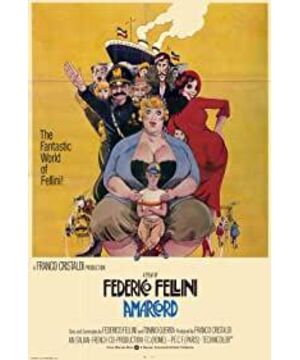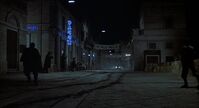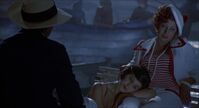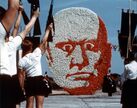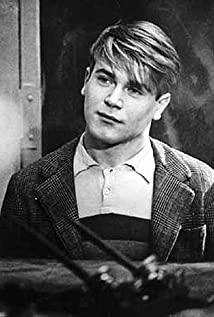He is the kind of director who can revive the memories of his hometown again and again after everyone's hometown has disappeared.
Thirty years ago, I read Greek mythology as a Greek mythology. Thirty years later, I read "Odysseus" again, only to find that it is a modern fable. It's not because I'm smarter and my understanding has increased, but because the world has become smaller. Many basic things can be seen, many basic feelings are the same, and many common destinies are not limited by language.
Odysseus has been wandering for many years and returned to his hometown. His home has been occupied by suitors. His face has been changed by the goddess Athena. No one in his hometown recognizes him, nor does his wife Penelope. Up. The goddess Athena covered his hometown Ithaca with fog, and he almost couldn't recognize it. "He was lying on the ground and kissing the earth" before he recognized his hometown. But his hometown still didn't recognize him, and later it was the old dog Argos who recognized him. The old servant Euryklea was washing his feet when he saw the scars on his feet and recognized him. He counted out the fruit trees planted in his childhood for his father, and his father also recognized him. The most important thing is that he and his wife Penelope have met. Here is a classic story: there is a secret between them that only the two of them know, when the queen shouted, "Move the bed over." At that time, Odysseus was shocked and said, "Oh, queen, who can move the bed I built myself, you know, it is made of the stump of a huge olive tree that grows near the palace. As the pillar of the bed. I personally cut off the branches and leaves, surrounded it with walls, and made the pillars with wooden stakes, and then decorated it with gold, silver, ivory, etc. However, maybe when I was away, Who saw off the stump, move it." After hearing these words, the queen knew that he was Odysseus. During the twenty years of Odysseus's wandering, his hometown was occupied by suitors who came in to propose to the queen, but they never knew the secret. The goddess Athena also doesn’t know this secret. She can change Odysseus’s face so that people in her hometown will not recognize him, but she can’t stop the old dog Argos, nor can she know the tree Odysseus planted in his childhood. It's those trees, I can't know the secret of his bed. Even though Athena had restored Odysseus's original face, people were still suspicious and couldn't believe him. It was the secrets of those hometowns that made Odysseus back home. At this point, Odysseus himself will never lose his hometown. But more importantly, the secret must have a matching certificate before it can take effect. If there is no old dog Argos, old servant Euryklea, scars on the feet (Odysseus probably removed it for aesthetics) , The fruit tree and the bed planted in his childhood, he is a liar. Therefore, what he worries most is "maybe someone saw off the stump and moved it when I was away."
Fellini is a director who keeps this secret for the world. If the bed is sawed off by the suitor, then you can find the bed again in Fellini's movie. It used to be the bed of Odysseus. Later, the world discovered that it was the bed of the whole world.
I have rarely left Kunming in the past years, and I will not leave in the future. But in Kunming, I became more and more a person without a hometown. I am less and less aware of my hometown in Kunming. This is not just because the advancement of modernization has given Kunming a new look. People's relationship with the world, values, ethics, and speed have completely changed. "The terrible beauty was born" (Yeats), but the terrible is not only the new aesthetics of the times, but the terrible destruction of the homeland world by the new aesthetics. The suitors saw off the bed. I remember that at the end of Fellini's movie "Sweet Life", there was a scene where people salvaged a monster from the sea. The worry that the home world is about to be lost, implicit in the whole movie, becomes a concrete symbol. In Fellini's place, he was only worried about "something is going to happen". In my place, the hometown itself has become a monster itself with nowhere to escape, behind the times, and the "suiters" have not even prepared a cemetery for it. And the monster in Fellini's movie became the god who ate his hometown and was cheered. Odysseus finally killed the suitor, the ghosts who had no hometown, and returned to his wife Penelope. Fellini is not so lucky, he has to rebuild a hometown in the movie by himself.
Outside my apartment is a large group of glass and cement monsters. They have the internal structure of a barracks and the gorgeous appearance of a free market. At night, the neon sign of another building hundreds of meters away from my window lights up. This is a moment of losing my hometown. In the meantime, I don't know where I am every time. A few years ago, I saw such a scene for the first time in Rotterdam, the Netherlands, and I was very impressed. Rotterdam was bombed to the ground during World War II, and the city was rebuilt. The hotel where I live is surrounded by companies, shopping malls, and apartments. At night, a certain blue neon sign on the top of the gloomy building lit up, and the letters on it were jumping and flowing. It is alone, and there is only one building in that area. Below is an empty office building with gray lights on, looking like a laboratory or a hospital. Because of jet lag, I often couldn't sleep at night, staring blankly at the neon sign, waiting for sleep. It made me feel more strongly about the meaning of the word "Western" than anything else. Later, I was in the hatch of the airport in Paris. On another rainy night, our plane was forced to land in Paris because of a thunderstorm. I once again saw a lone neon sign on the dark buildings, and later in a hotel in Sydney. Finally this guy came to my hometown, just outside my window, rainy night, autumn, and its world at night, always like this, attracting my eyes, making me feel like I am on my windowsill Is it in a foreign city, in Rotterdam, in Copenhagen... My hometown has not experienced a big bombing or what is it that made us destroy our hometown and rebuild everything?
I entered Fellini's movie one morning, and what I entered was "Want I Remember Back then". I'm a person who wakes up when the cock crows and will go to sleep as soon as the sky is dark. The life habit I developed in my hometown in my childhood is indeed a big cock that helped me develop this habit. I remember that I lived in a cadre compound. The compound was like a village. Most people raised chickens, but there was no special chicken pen. When it got dark, the chickens went back to their homes in twos and threes. I will always remember the scene in my childhood when a chicken probed his head and appeared at the door of my house, and the night followed. I kept the chicken under the table in a chicken coop, and when it was about to dawn, it screamed loudly. I didn't like it when I was a child, and I hated it very much. I was always woken up by it when I was still asleep. When the chicken cried, my grandmother got up and put it outside. I went back to my dream, but time was running out. That is a very beautiful big rooster, or there have been many of them, but in my memory it is only that one. This chicken allowed the ancient time to extend to my life, and I became a person who always followed the sunrise and walked in and rested. Even if my family cancelled the old tradition of raising chickens, I still woke up when the cock crowed, and I opened my eyes and saw the gray dawn. One day I watched a French movie and said that the protagonist went to live in the countryside specifically to enjoy the dawn, starting and being born like the world every day, but in the end he failed and his life could not rise at dawn. I realized how blessed I am. My living habits have become rare and "farmer-like", just like the rare "native chicken" that city people consider today. Thank God, I have continued the time of my hometown, the time of the native chicken in my life. This habit has become one of the laughing stocks of friends today. It means a funny image of a conservative, outdated, outmoded man. The world's view of time has changed. People are developing something that can make spring come in September. Technology, a peacock in the snow. I insist on going my own way. Because I get up early and go to bed early, I often feel lonely in this era. The loneliness of thinking comes from the loneliness of life and living habits. I often start working early. Waiting for the world with excessive nightlife and puffy eyes to wake up, and I am writing in the dream of the world. So the first time I watched Fellini's movie was at eight o'clock in the morning. I think maybe there is no second person in this world who will watch Fellini's movie at eight o'clock in the morning. In order to be able to play this movie, I bought a new DVD. I don't know how to use it. I don't know that there is a selection button for language subtitles in this machine. "Thinking about the year I remember" is available in Italian, English and Chinese When it was released, I thought that the film was not translated, so I just watched it in Italian, just like the neighbor of Fei’s house. I found that I fully understood what the film was talking about, and even guessed what the characters in it were saying, laughing, smiling, and knowing smiles, as if this movie was talking about my youth. Later Jack Ma told me that there was a language selection button, and I read the Chinese version again. Those lines were similar to my guess, especially the words that the crazy uncle climbed up to the tree to shout. I guessed it was yelling "I Who do you love?" He called "I want a woman." The basic things he desires, women and reproduction.
What Fellini created is not a movie, but a hometown. This hometown is not Fellini's hometown, but the basic hometown of mankind. Everyone knows the hometown. That morning, I was in Kunming and I returned to my hometown through an Italian movie. Fellini’s power is like this. He maintains our hometown for us, so that our secrets about our hometown will not die without evidence. He remade that bed in his movie, and it can never be sawed off. "This past should be preserved like we know ourselves and our history, and it is worth experiencing so that we can live in this moment more consciously" (Fellini). In this era, the hometown itself has no power to preserve itself. Preserving the hometown has become the mission of poets and artists. I can return to my hometown through Fellini's movie, just like Odysseus who was surprised, returned to Ithaca all his life, and found that his wife was still waiting for him surrounded by 116 suitors. Just like the poet He Zhizhang, the young man left home and returned to his boss, tears filled his eyes in the local accent.
Fellini's lens is aimed at the most basic things. Those scenes are even below the ordinary, more basic than ordinary. A river is generally water, but more basic is a river bed, which is the immovable stone in the river bed. Ordinary flow has passed, but the river is there, and the river is not water. It's the kind of thing that keeps the river in. It is a container, Fellini represents a container, a bed, the kind of thing that this world can carry.
The paradox is that he rebuilt his hometown as a liar. He used lies to keep a true secret. Rimini no longer exists, he can only make up it, but what he made up was not Rimini, but the memory of the world about his hometown. What he didn't lie was the memory. His lie is Rimini. The memory is real, and the touch caused by the memory is real. Whether the bed is no longer important or not, you can also saw it off, but as long as you enter Fellini's movie, the bed will appear.
Every time you enter Fellini's same movie, it is like entering a new movie, just like life itself. People on the scene always forget what has just happened, and can only remember it at a specific moment. And every memory is different. It is impossible for people to enter the same river twice, nor can they reproduce the same memories. No matter how the details of the memory contradict each other, the important thing is the memory itself. It is a river. Once you step in, it will reappear in the past.
There is no dramatic mechanism in his movie life, just the sequence of winter, spring, morning, and evening. You have entered this movie but you can't tell it completely. You can only tell some fragments, short paragraphs, and this is the memory. Memories are not memories, not going back to the past, but the mind is resurrected at this moment through the flow of time.
Hometown is the place where we are resurrected. It is not the past, nor the future.
"I remember" is just a combination of some fragments, but there is an overall power that makes us sink into our hometown.
He is a director who doesn't play a little bit of fancy, because of this, later directors started from him and played many new tricks. For example, in a seemingly realistic atmosphere, there are always abnormal things, a peacock that opens in winter, a monster salvaged from the sea, etc. This Fellini-style symbol is fully utilized by later directors, such as Those wearing masks at the end of Antonioni's "Zoom". What Fellini showed was not something weird and absurd, but a premonition. In the most comic-style scenes, it still implies the most basic emotions. How strongly this movie brought me back to my hometown. Its smell, atmosphere, language, story, I almost thought that I had experienced all that, I can put my "year" and the year in his movie. During the Cultural Revolution and the impulse of adolescence in his youth, every teenager thinks he is a unique public lover... a great hometown. In the movie, the whole city is sent out to the sea to wait until late at night to watch the huge cruise ship from the United States. My memory is flooding. I remember that around 1972, Kunming was still a city not much bigger than a small town. Two hours is enough for you to make a circle of this city. One day, a rumor suddenly spread throughout the city. In the northern suburbs, I found a smoking tree from one to six o’clock in the afternoon. At a certain dusk, it happened by coincidence. Allure went out, through the golden sunset and the fields, to see the smoking tree. At a surreal moment, thousands of times. Ten thousand people squatted around a few trees near the Kunming Cigarette Factory, craned their necks. Until the night comes. At that time, people longed for a certain change in their lives, and they had reached the point of insanity. Even if a tree smoked, they believed that it was some kind of good omen. They were actually expecting a Godot, a God, and a new world to emerge from the tip of the tree. This is exactly what Fellini's films want to show, people are superstitious about the future, the people under various systems. The existence of strong conditions is definitely different, but the desire to "will change our destiny" in the future is exactly the same. In the deep night of the sea, Grace was stuck at the moment when the illuminated luxury cruise ship passed by, and she opened her arms and threw a kiss to the modern paradise, which showed the sincere feelings of human beings for a nihilistic modern vulgar and simple yearning. It is unparalleled, it is one of the greatest shots of the movie.
In fact, this is not what Fellini meant, he is the most meaningless director, because "everything in the world is poetry", there is no such thing as poetic and non-poetic. When he is the most meaningless, the undercurrent of meaning is surging. Because he has a position, the position itself is the coordinate, and automatically releases meaning, rather than interpretation outside a silent planet.
Fellini’s films have a living intertextuality. You enter his film hometown, but you are writing about your hometown.
What is the first shot? Hanging clothes in the sun, a mother came out to dry the clothes, looked up at the clear sky, and the flies of spring were shaking. One shot takes you back to your hometown. It’s as if you’ve been there, basking in the sun outside that woman’s house. When that woman looks at the sky, you also look at a certain part of her body, whirling obscene thoughts quickly. She is the distant house where Aunt Wang’s house came yesterday. cousin. Where is there no such hometown in the world? The most basic hometown, it will not be polluted by any ideology, it cannot be extinct by language violence like Mandarin. Fascism is not the end, concentration camps are not the end, and the Cultural Revolution is not the end. The terrible doomsday is when the everydayness of life presented in this lens is destroyed.
Fellini tricked you. A bald head went out from the barbershop. His identity is not clear. Maybe it's a nabe or a street ruffian, the mysterious figure who rides a motorcycle through the town late at night? The expression is meaningful, insidious, and intriguing. You think something serious will happen later, a murder or an informer call, but nothing happens, and this person has never been seen in the movie. The greatest skill of Chinese film directors is to make faces right or wrong, or clever, simple or cunning, noble or rough, do human faces have this quality? Fellini said: "All faces are correct, and life can't be wrong." The audience can guess the connotation and value, meaning, and style of the imaginary face, and divide the world into red faces and white faces based on conventional or self-righteous knowledge, concepts, education and sophistication. This is how they deal with the faces of the world. But Fellini never did this. The well-dressed wife said vulgar language such as "The doctor is a silly B." A handsome and beautiful man who meets the aesthetic standards of Life magazine is also an intellectually excessive idiot. The dialogues between the characters couldn't be more everyday, as if they were just a sentence that accidentally floated into the ears at the vegetable market or the hospital fee, but it made up the whole movie. The large-scale campfire welcoming the spring in the evening was a casual statement by a customer in the barbershop during the day when he touched his shaved head, but he couldn't hear one of the innumerable trivial phrases. Of course, he can also shake his left leg after urinating and say "The revolution has begun" when he buttoned the button. It doesn't have to be said only in the Winter Palace.
Ah, Graceka, the breasts and buttocks of the hometown, the spring dreams, rumors and fairy tales of the hometown, the passion of the hometown, jealousy and the gas station of male rivals. Grace card symbolizes the vitality of life, hope and tortured passion. Whose hometown does not have Grace Card, whose youth has not appeared that popular lover, "eternal women, guide us to ascend" (Goethe). The ending is the same, and in the end he left sadly and left his hometown. We always think that the miracle, stories like Prince Charming in the myth will happen to her. All the men in my hometown have a crush on her because of their low self-esteem, thinking that she will marry "more so-and-so". However, she is waiting for a mediocre person to marry her home in passion, loneliness, and self-pity, what she longs for It's just the most basic life, a home. However, she was misunderstood as being too high-minded until she was really desperate for her hometown and was about to become a real resentment. Finally, she left with another mediocrity in the distance, and we became our own painter Mao Yanshou. Graceka's bridegroom disappointed all the audience, what a lackluster and mediocre fat man! What Fellini meant was that she actually belonged to you, but you let her wait until she was thirty and ruined her life. Your education, your knowledge, and your upbringing do not allow Grace Card to marry a small person like you. You are your hometown, and Grace Card is not. She is the future. She belongs to the luxury cruise ship from the United States. You never knew that Grace Card was not on the cruise ship either. She is the future, but she is the future of the Rimini dialect. This future is no different from the past. It is the beginning of the movie to pass on the lineage and have children. This future is the beginning of the movie, a scene of a mother drying her clothes in the spring when catkins fly. That is the future that Grace Card longs for, not some big ship from the United States. But the vanity made Rimini never dared to say it with confidence, it was just whispering, indecisive, and honestly at this point. Rimini has little power except the classical passion and adolescent sexual impulse embodied in the protagonist Tida in the movie. It has never become a powerful will like "modernism" or fascism. Italy is a region where futurism and fascism are rampant, and Fellini is unforgettable. Grace Card is not the future of "modernism", it is the future of Rimini. When she left, Rimini's heart was empty, and life suddenly became boring, meaningless monotonous repetition.
Fascism and modernism seem to be very different, but they all have one thing in common, that is, they both pretend to represent the "future" and are the "correct will" of their own time. In Fellini's view, the real future is Rimini's Grace Card, but how lonely she is, "No one wants to marry me", "Future" is eventually forced to leave her hometown, and there will be no home in the future.
As a symbol, the future of modernism is the abnormally opening peacock that ominously opens in the snowflakes of winter. It makes the classical time wrong, but in fact it is in line with the logic of modernism time. The speed is faster and more. It's fast. I often see signs in Kunming that say "effective in one minute" and "rapid treatment with traditional Chinese medicine". And Graceka's future is a slow process. As I wrote in a poem, "The earth has the speed of the earth." "Spring is not an elevator / the push of a button / rises to the green floor".
In another movie "Sweet Life", someone living a happy life (villa, car, designer shirt, well-off or above) whom Malceny envied, committed suicide without reason and warning. I believe that person is " The husband of Grace Card, the future that Rimini laity dreams of. In this movie, abnormal things reappear. In "I Remember That Year", it is a peacock on the screen in winter. Here, people salvaged a huge monster from the sea.
We live in a modernist future without "Grace Card". We only have to move forward, not the past. To apply Fukuyama’s fashionable theories, the history of "Grace Card" is over, and the history of dialects is over. English, oh, no, Mandarin and English in China - as well as plastic Barbie dolls and McDonald's fast food, are our future and destiny. .
Fellini is a hometown for people with hearts, a cure for forgetting. In "I remember thinking about the middle of the year", there is a clown-like character in Shakespeare's plays. He introduced the history of Rimini. He mentioned Dante, the great poet who had been to Rimini. Dante, a dusty name. It is only in the hearts of poets like Fellini that he continues to live. This is Dante’s hometown. Is Dante dead? Is he in the past? Isn't he the future? Dante is a hometown. He was not the last poet of the Middle Ages and the first poet of the Renaissance. He was a boring theory based on the theory of evolution. Dante is his hometown. His hometown continues into Fellini's movies. Grace Card—is Bellad Rica, the eternal lover of poets, is Desmona of Othello, Wang Zhaojun, who is covered by Mao Yanshou, is Ophelia of Hamlet... Of course, Ge Laiska is the closest to us, and she lives in the same compound. Odysseus finally returned to his hometown because his wife Penelope was waiting for him among countless suitors. Graceka's fate is different. Her hometown thinks she should marry the suitor on the American ship, and her hometown saw off that ship automatically. Odysseus's wandering is different from the "on the road" of our time. His wandering is to return to his hometown forever. Our "on the road" is to abandon the hometown and the most basic world. Among other things, how many faces have we abandoned. Yesterday I saw a standard photo of cosmetic surgery in a beauty salon. There are only less than 20 patterns left in the face of the future in the world. This is the paradise of painter Mao Yanshou.
Grace Card is hometown, and women are the closest to hometown in our time. The men are hopeless, Odysseus who doesn't want to go home. Women, grandmothers, grandmothers, mothers, sister-in-laws, sisters... Why is the hometown gentle. The classical tradition of women and the instinct of reproductive creation are the biggest obstacles to modernism. They always put everything in vain and return to the most basic memory, reproductive memory and life memory. Modernism uses homosexuality and countless beauty salons to deal with women. They saw off Graceka's bed. But Fellini saved Grace Card and continued Grace Card. He made Grace Card live in a desperate manner next to us. Look, she is the lady who is watering the flowers on the seventh floor of the apartment opposite. , Her skirt brings spring.
Fellini is a world that allows you to penetrate deeply. He is a mother, if your soul can reproduce. The more time you spend with him, the richer and deeper your soul is. Although "profound" is a pretend word in my dictionary, I still want to say Fellini is profound. He is a director with a standpoint and a heart like a sea. He is not a so-called realist, or a critical realist. He expresses basic things. Basically, when presenting this world that is obscured by the noise and glitz, you find that it is a position. Fellini is a landlord. He has the ground, his position, his body and his feelings. He is not wearing pants. Cloud. This is the result of the basic things being displayed. The basic things will not appear naturally. It will not have a simple and objective appearance like realism. The "objectivity" that realism talks about is only true. Illusion, it is just a clever use of simplicity to fabricate facts, it has no position. Because "the facts have become more complicated, more disguised, and no longer so obvious, so ostentatiously rendered." "That fact. Because it is hidden in the annoying familiarity, hidden in the most conspicuous things that daily life is accustomed to. , Has its constant inevitability and completeness, almost inviolable sacredness" ("I am a liar") realism, if this idiom can be established, then it is the kind of "swaggering rendering" that obscures The energy displayed by it is the power that makes facts false, makes humility and exaggeration, calms anger, and softens violence. Everything returns to the basic level.
Fellini's hometown is not the so-called beautiful things. Those warm things that are widely praised in romanticism and minor qualifications. The other name of "Thinking Back then I Remember" was "Small Town", but it didn't work afterwards. In contemporary culture, hometown is usually simply understood as the nostalgia of heart-to-heart, such as sunsets, small towns, small bridges, and flowing water. This is not the hometown, but the suitor who conceals the hometown and eats and drinks. Fellini's hometown is existence itself, it does not matter whether it is old or new, correct, ugly, beautiful, elegant, decent, vulgar, etc. It includes the small town of Rimini, Gresca, the proprietress of the small shop with huge breasts, spring, snow, night...It also includes the fascist air of that era in Italy, whistleblowing, interrogation and madness, moral corruption, sensuality, kindness, simplicity, Honest, crude, cruel, exaggerated, vanity, funny, etc. The hometown world is not a utopia supported by a correct ideology (neither a quagmire nor a temple), but an existence. It is even the basic method of making Fellini movies: "There is no ideal situation for filming, or it should be said that all situations are always correct, because they let you make the movie you are making now." ("I'm a Liar")
Fellini has repeatedly declared that his films are expressive. Yeah, have we ever reproduced anything? Fellini is a director who appeals to feelings. He is a director who has the power to be faithful to his own feelings instead of the so-called reality. Therefore, he is a very free director. If that feeling is exaggerated, he can express it exaggeratedly, such as the scene about fascism in "Want to Remember Back then". If that feeling is metaphysical, he can express it abstractly and exaggeratedly, for example, the four-not-like monsters salvaged from the sea, and so on. And this kind of loyalty to feelings is more powerful than any so-called "realism". It just presents the absurdity, comedy, and tragic spirit of life. The feeling is easy to drift away, and the feeling is directionless. Fellini’s strength lies in that he is a director with a standpoint. He can always control his feelings to his basic standpoint, so in his movies Here, what I see is the harmony of various expressions. The feeling of "Want to Remember Back then" to me is a very simple and moving memory, but how contradictory are the various parts in it. The exaggeration is almost a comic, a natural place, and it looks like a documentary style. From this I think of Chinese films. Those directors can be said to be the best in terms of so-called skills, but they will always be like the hard training skills of a conservatory of music for the high school students participating in the international piano competition. They have no standpoint and no soul. They occasionally shoot something with faint light, but then you find out right away that it's just a shot and changing places, so incredible things often happen to the same director. He can direct the interesting style of "A Lawsuit in Qiu Ju" that looks simple. Suddenly, he floated on the feathers of a soulless commercial film like "Hero".
The other scene was a campfire party held in the square of the small town of Rimini to welcome the spring and burn down a witch that symbolizes coldness and hunger. This scene connects the hometown of Rimini with Yunnan. You can no longer film such things in Kunming. The ancient ceremony of welcoming spring has been banned in the revolution and then forgotten. Think about the so-called "Spring Festival" in Chinese cities today. What is the difference between May Day and National Day? And the "Spring Festival" was once an important, cumbersome, and mysterious ceremony in Chinese life. The ceremony of welcoming spring in Rimini reminds me of the festivals of those ethnic minorities on the Yunnan Plateau. I remember that among the Lisu people living near the Nu River, there was a Knife Bar Festival. At the end of the festival, people were jumping on the embers of flames. If Fellini wants to find a Rimini in Yunnan, he can't find it in Kunming, but he can find it in minority villages and get it in place. But in Yunnan, these dilapidated and old "Rimini" are so backward and embarrassing in the eyes of officials. It is by no means the direction of daily life development, and there is no need to respect and maintain it. The tourism resources are only brought by song and dance troupes. Save it. I don't know whether the Spring Ceremony in Rimini has become a performance project to attract tourists. Fellini is dead. People are watching TV today-"A piece of furniture" (Fellini).
After the 1966 revolution, my heart for this country has no hope. Postmodern "anything will do" has a natural foundation in China, and its roots can be traced back to "the way is drowning in shit". Fellini also talked about Lao Tzu, but what he got from Lao Tzu was a standpoint. This position is new blood for Western culture with a tradition of logos and rationalism. "Of course, "Thinking Back When I Remembered" did not pass the perspective of ideological and historical appraisal, to review, restore, and reproduce fascism from the outside; I am not good at making objective judgments. I always feel that it is so indifferent and full of details. His analysis and collective judgment are a bit abstract and cruel.” Fellini seems to have ancient Eastern blood, which reminds me of Taoist views of right and wrong. The things that Fellini are subverting, we seem to be constructing in full swing, such as the simple denial of the Cultural Revolution in contemporary China.
Duchamp is a shocking position and a new ghost in the history of Western art. And a Chinese Duchamp is terrible. He must be a cynical, clever man without a stand or soul. All Fellini's movies are actually Kafka style. What is Kafka? For the West, this is part of a great soul resistance movement that began with Nietzsche. In fact, the root of globalization is to use objects and technology to destroy the mind, just as in China's 1966 revolution, "revolution in the depths of the soul" wiped out the traditional Chinese spiritual world. The resistance from Nietzsche to Kafka to Fellini is to hold on to the soul. The mind is an ancient existence, and the world has been expressing it through various civilizations. Today, the civilized movement that expresses the soul is facing serious challenges from "hollow people", "rubber people", "plastic people", "floating people" and "smart people". They "everyone has a quarter of an hour." (Andy Warhol)
But how vulgar are the words mind and soul in China, always equating "soul", "spirit" with "correct" and "noble". This is a dead soul.
Fellini said, “If politics refers to living and working together in a society composed of individuals who respect themselves and know that their freedom cannot hinder the freedom of others, then I think my films are also political films. "This is Fellini-style psychopolitics. In "Thinking of the Year I Remember", Fellini treated fascism in a comic style instead of suffocating and violent scenes. Because fascism in the eyes of God is just a passing moment, it looks huge and invincible, but in the end it is just a cartoon exaggerated by the times. Fascism is not everything, it is just a dark cloud in the sky of hometown.
Fellini said, "Fascism and adolescence are still eternal historical moments in our lives." "It is not enough for me to join the anti-fascist party to reject that side, which is deeply rooted in each of us." Fascists "have ever made a cry for it, and it has its status and prestige." This is the deepest point of Fellini. Ordinary directors may make a certain period of history a complex or an excuse to vent their coquetry. Although Spielberg's movie has a strong visual effect, it feels so intense, it is a testimony of experience, and it is a little bit curiosity and exhibitionism. His film is too angry, but it gives me the impression of lack of standpoint and lightness.
Fellini sank from the surface of reality and reached the foundation. His weight causes him to be directional. Rather than drifting with the flow under the guise of so-called "objectivity" like realism, there is no direction.
Fellini is not presenting this. He is presenting this. He has a standpoint. Whether in "Sweet Life" or "Navigation on the Sea" or "Thinking I Remember Back then", the author publicly criticizes both fascism and "political correctness." He never conceals his critical stance on "modernity", although it is obvious that he is the darling of avant-garde and modernism in the field of film, and no one thinks Fellini is an old stubborn. Calvino said that "Fellini's intellectuals are always desperate." The era is nothing but despair. In fact, this is also Fellini's own despair.
Isn't it desperate? Graceka has no end, and the dialect is homeless in the dark sea.
He is critical, but it is not simply right and wrong, pros and cons. His criticism is pure criticism. His criticism is not the ideology of a certain era, but the shader. It is "objective", "passion", "technical", "evil forces", "righteous forces", and so on. thing. There is nothing more difficult than going back to the basics, and nothing more desperate than realizing that "all that" is not the suffocation of reality, but the suffocation of the basic aspects of the world. Fellini’s performance does not seem to be as obvious as the absurdity of Kafka’s works. It is easier for viewers to enter his world, but his despair is not overwhelmed by Kafka. What they express is pure despair, basic despair, this Despair is incurable, it is the foundation of existence. "Almost all schools, or at least the school I attended, always want to transform, dominate, and rigidize what should be conveyed. Make it impoverished, and reduce it to a string of stinky and long abstract concepts, meaningless, until the end. , No longer refer to other things except oneself, and has nothing to do with everything. For example, the knowledge and discovery of dunya obtained in school belong to the knowledge of nouns and professional terms. It only helps to be suspicious and boring. , Unremarkable, boring, at best it is a military-style, unqualified, a little racist world to establish a connection. In short, it is as offensive as your well water, as offensive as mathematics and chemistry, just like being a soldier. An indifferent world". The profound thing about Kafka and Fellini is that they don't expect a "better" transformation of this world, but they wait and die because they exist. They have become immortal thorns in the eyes of the world because of this world.
Without this suffocating foundation, the world would not exist. Fellini Kafka's attitude towards this state is by no means the "angry young" anger of Ginsburg and the "crossed generation", but "present, that's all". This is the deeper foundation of the world. The goal of the "paradise for all mankind" to be created by modernism is also to transform those parts that suffocate life. "Modernism" is actually an angry youth who pursues the light and hates the darkness. This superficiality makes the anger of modernism only the object of its anger over and over again. Because modernism is superstitious "on the road" and "future", modernism has no hometown. And what Kafka and Fellini show is just the basic hometown, absurdity is its foundation, there is no right and wrong. The superficiality of modernism is that it attempts to realize a non-ridiculous "human paradise", and its resistance is based on the progress of "right and wrong". However, Kafka and Fellini are not progress, but just show how they are. Therefore, this feeling is not criticized in Fellini's films, but expressed. Fellini did not become an angry young man "on the road" who abandons his hometown world. His films are never angry. He His passion calmed him beyond anger, becoming a basic despair.
His despair is manifested in the simple joy and desire of the people for modernity. It was a desperate moment, when the small town of Xi Shi pounced on the luxury passenger ship passing by in the dark sea. She finally married a rich man from a foreign country, and left her hometown. Abandoning or covering basic things has become the mainstream of our time. "I left Rimini in 1937 and came back in 1946. I walked to the seaside with broken tiles and there was nothing left. Only dialects came from the ruins. The immortal tone called out: "Du Rio Severier, "Those weird names." This is the basic mood of Fellini’s world, a little exaggerated, a little more affectionate, or a little more realistic, we can also see his complaints, "I was surprised at being in the wooden shed. The diligence of the people living in them, they are already talking about the hotels and apartments, apartments, and apartments to be built, and they have a strong desire to reorganize their homes." "I had a childish impulse at the time. The play seemed to be over-acted. Why, The theater is gone, the tree is gone, the home, the community, the cafe, the school are gone! I think we need to respect certain things. Well, it was war, but why did they destroy everything?" "Later they Take me to see a large model in a shop window. It is said that the Americans promised to rebuild the entire Rimini at their own pockets. The Rimini people came to see and said, "It's like an American city, who wants an American city? "This kind of little sentiment never influences Fellini's movies. He always goes over them and sinks into the roots.
The 20th century destroyed everything and rebuilt everything. War and revolution are two different ways, but the results are the same. The basic words "destroy" and "reconstruction" are the same. The war caused Fellini to lose his hometown. He loses the form of his hometown first, and then the content of his hometown.
The ideological revolution in the 1960s caused us to lose the content of our hometown, the poetry, literature, drama, music and life traditions that were destroyed first-reactionary, "the world is our world, and the country is our country". Let the hometown become a cultural shell, and then unify content and form in the triumph of modernism. I can use the words describing contemporary architecture to describe the ideology of the past: tall, bright, bright, rigid, at the core, face-saving but living in it is insecure... etc. Fellini left his hometown, "I deleted Rimini by myself" "However, I found Rimini again in Rome". He found his hometown world in the movie: "The end of the world begins at the same time as us, without the meaning of ending; let us think. It is just a movie for pure audiences, which is the history of our life." (Calvino)
In our revolution, the movie itself was destroyed. There is no Fellini in this country because we don't know who his Rossellini is? We do not have Rome. Rome is the most basic symbol, and if this symbol is destroyed, then Rimini will never be found. Calvino said, "Fellini made his film into Italian hysteria. Before him, that strange but familiar hysteria was regarded as an exclusive phenomenon in the South. And he was in "Thinking of the year I remember" Once again, the geographical intermediary point, that is, his province of Rône, is defined as the backbone of Italy's behavior and the true integrator." He meant that the great Fellini replaced the absolute of Mandarin with a basic primitive dialect. To rule, he replaced Rome with his hometown of Rimini. In fact, Fellini has actually become the film root of the term "hometown" that transcends the dialects of the world.
Who is our Rossellini? If one of us pretends to be Fellini. We don't have Rossellini. We have to create our own tradition that can last forever, and we have to inherit a tradition for ourselves. We are different from Fellini, we do not automatically live in tradition, we have to plan out a tradition in the ruins. The advantage of the ruins is that it has no nationality and history, so the tradition of our time can include both Lao Tzu and Heidegger, as well as Guan Hanqing and Fellini. For me, I better understand the non-nationality of the term tradition. It is a hometown of the world.
The path to tradition is a personal creation, not the result of education. On the contrary, the true tradition is obscured by education.
"Rome is of special significance because we are from our hometown", that is, the world is meaningful because we have a hometown. If there is no hometown, what is the meaning of this world? If Rome is everywhere, the road to Rome is a highway, and there are no longer countless roads of varying textures leading to it, what is the meaning of this world? Hometown is different from hometown. Hometown is a concept of so-called "world literature", and hometown comes from countless individuals. There does not exist a hometown without a specific hometown, but universality is being used by globalization. Cultural industries supported by economic forces use local knowledge to pretend to be universal knowledge. A "world movie" without a home can pretend to be "universality", what is Hollywood? World movie. What is McDonald's, universal food. But this is not Fellini's world hometown, Fellini's world hometown has details.
When Roland Barthes distinguishes visual works, they are divided into two categories: "STUDIUM" and "PUNCTUM". The former means "strictly educated emotions" "knowledge and courtesy" caused by photos. The latter is destroying, disturbing, and hurting the former. The former is not someone else or an abstract education system, but the "cultivated me" who is enjoying the photos. The former is rational, "makes photography and society reconcile", conveys news, reproduces scenes, surprises people, emphasizes meaning, and makes people yearn for. And "PUNCTUM" is "details." It is not meaning, emotion, but details.
Hometown is the heart and soul. This heart has a home. It is not abstract. It's all the details that only you know, Xiaomingtang, it's the measure you need to master when inserting the door key into the keyhole, otherwise you won't be able to open it. After all, isn't hometown just a series of details, short stories and tidbits.
Globalization is the abolition of details, and hometown is the persistence of details. Details are the root of the world's hometown. If the details are eliminated, the hometown will die, and Fellini's movies will not exist. What is remembered after the movie? Countless details. Grace Card is a detail, Wang Zhaojun is a detail. Why can Odysseus return to his hometown, because the details about the bed are kept and persisted.
Fellini is a clown, he is full of details, details are life, partial, and can be created all the time
from. He is not a well-dressed, well-dressed person sitting in a tight-knit suit, with the correct meaning, and no details but etiquette. His films are the process of the birth of details, not the interpretation of meaning.
All of Fellini's movies are just to return to the phrase "I remember". And "I remember" is a dialect, not Mandarin. "One day in a restaurant, when I scribbled on a napkin, I said "I remember"; but well, I told myself that I will be recognized as "I remember" in the Romagna dialect immediately, and I need to be cautious. What I avoided was to follow the autobiographical clues to interpret the movie. I remember: it was incoherent language, the clock tells the time, the phonetic transcription jitters, the sneaky sound..."
What I particularly hate is those dubbed films, how they ruined the original work. I was once influenced by these films and thought that the characters in foreign films all spoke Mandarin in an opera accent. It made me feel inferior to my Chinese dialect.
The mission of poetry and art today is to preserve memory. Fellini's memory is his hometown. Pasolini's memory is experience. Tarkovsky's memory is psychological and metaphorical, which is suspected of Freud. In Pasolini's work, the most powerful force is for you: remember. The end of "remember" is the judgment of "what", forgetting means betrayal. While Fellini is memory, hometown is a verb. Memories are not just about the Cultural Revolution and the Germans, they are just the present, the river. Fei’s memory is a memory of life and life, why live? It is the memory of basic details, basic elements of basic emotions, and the memory of the container. It is the memory of the breast, not the milk. This kind of thing often flashes at a certain time in life, like a stone under the river, accidentally showing up at low tide, a detail. People are conscious, but it is easy to forget. The most easy thing to forget is the details, not the meaning.
What Fellini insists is the memory itself, the memory is the hometown, the memory is not the sublimation of the hometown, nor is it remembering, the memory is even the details born out of ignorance.
Tarkovsky sublimated the film into a film art, eliminated the details, inspiring the desire for interpretation, and the audience was elevated into a self-righteous cultural elite and modern poetry lovers of fake orangutans. On the contrary, it is far from the film, unattainable, satisfying the "elegance" of petty-bourgeois audiences.
Tarkovsky evokes the desire to go deep into the “behind” of the picture to find the “why”, while Fellini goes to the picture and is there.
Pasolini is suffocating, and the experience is terrifying. Fellini makes people love the world. He doesn't hide anything, sublimate or deny anything. The world is like that, even if it is hysterical, life has to go on.
One day in the downtown of Kunming, I watched a Fellini-style movie. Near the fountain, a group of idlers gathered around a young man in ragged clothes. The teenager was listening to the music from a nearby store and imitating the steps of a fashion model. He had a little braid behind his head like a trendy artist. He walked very well, and occasionally came to a soft disco, which was very action. beautiful. The people around just laughed, but if the scene becomes a competition immediately, let all the onlookers perform. All kinds of ugliness and clumsiness will be revealed immediately, and they are not qualified to laugh at him. The boy was more proud of his laughter, and more inspired by jumping. He respected him and never appeared on that occasion for a minute. He did dance well, maybe he was mentally ill. This constitutes the superiority of those viewers, who enjoyed it once for free. Prove his spiritual superiority. Fellini: Said that the world is full of clowns, "When clowns are good for health, one can finally do what he wants to do: smash everything, tear, set fire, roll on the ground, no one will blame you, On the contrary, they will applaud for you...". Fellini's movies hide a certain clown spirit that does all things. He is a clown. What is a clown? The clown is the living person who is full of details in front of the sitting person.
Fellini said, "I have to repeat it again: the only record a person can make. It can always only be a record of himself. "The only real realism is vision." Who said that? The testimony of vision to events is Facts are the most true of existing things".
Fellini recorded himself most honestly, and he was a great liar.
7/15/03 in Kunming
View more about Amarcord reviews


